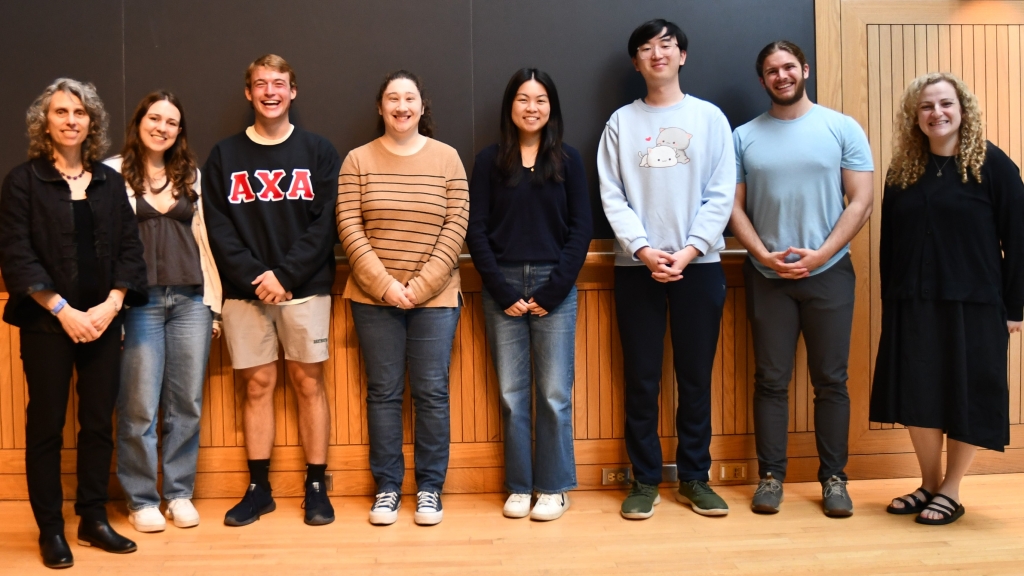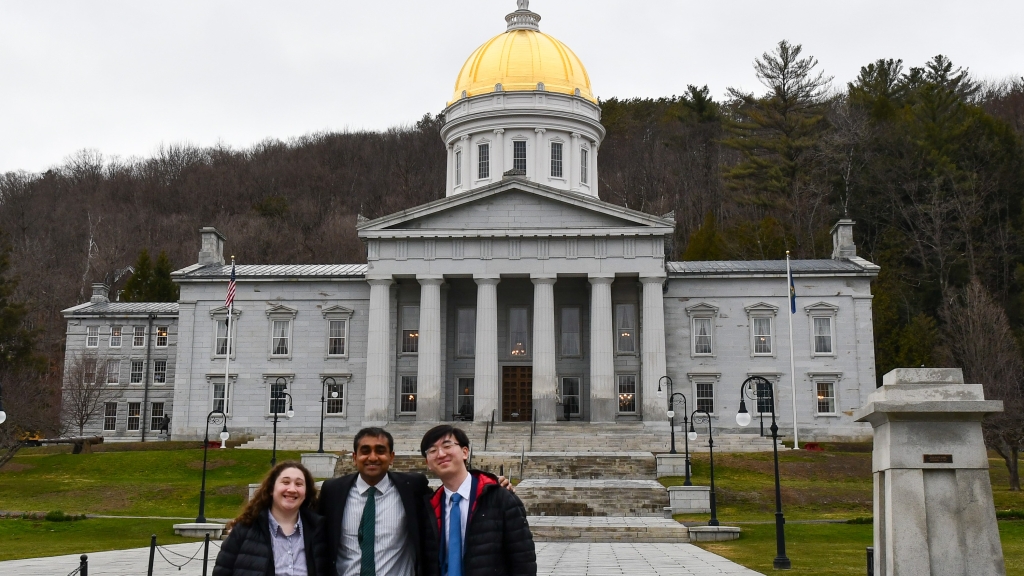For just over 20 years, the Nelson A. Rockefeller Center's Class of 1964 Policy Research Shop has provided nonpartisan policy research reports to lawmakers, courts, and nonprofits in New Hampshire and Vermont to help inform the creation of data-driven public policy.
Students start with the class Public Policy 45: Research Methods, where they learn about qualitative and quantitative research skills. The class solicits research projects from policymakers in the two states during that same term, then small groups meet with the "clients" to design a research proposal.
In winter term, they dive into wide-ranging research that includes surveys of the literature, interviews and surveys of stakeholders and experts, and analysis of government and private data from the sector, and then formally present their findings in an official research report and through formal testimony before legislative committees, nonprofit boards, and nongovernmental leadership committees.
"What I encouraged all the groups to do is look at the research from every angle. We want to have all the perspectives considered," says Kristin Smith, the Policy Research Shop director.
"By having a nonadvocacy, nonpartisan research product, the results of the research can meet the policymaker's objectives of having a range of proposals that are based on research rather than partisan viewpoints or anecdotes."
And the opportunity to strengthen research methods and communication skills attracts students from across disciplines.
"One very wonderful thing about this class is that it draws from multiple fields and departments," Smith says. "So students who are majoring in environmental science, or government, or economics, or sociology, or anthropology, or history all come together in this class because they have a common interest in public policy."
Alan Cui '27, along with Erin Parker '26, and Pranav Akella '27, presented their review of home heating energy efficiency in Vermont in April to the Vermont Senate's Committee on Energy and Natural Resources.

Members of this year's Rockefeller Center Policy Research Shop program include, from left, PRS Director Kristin Smith, Lucinda Gullison '26, JJ Dega '26, Erin Parker '26, Emily Leung '27, Alan Cui '27, Jesse Fitzelle-Jones '27, and postdoctoral research associate Elle Pfeffer. (Courtesy of Kristin Smith)
The three students looked at the mandated emissions reduction benchmarks for 2025, 2030, and 2050 under Vermont's Global Warming Solutions Act, reviewing the impacts of household adoption of weatherization, cold climate heat pumps, biofuels, and natural gas on Vermont's climate goals. The report identifies an energy efficiency gap in the thermal sector occurring primarily due to costs of greenhouse gas emissions on the environment, and possible barriers to adopting energy efficient technology.
Reviewing a broad menu of proposals and initiatives, the team identified low-interest financing and energy efficiency utilities modifications as the policies that best meet the emissions reduction goals. The report also identified three major challenges to implementation: trade workforce development, grid infrastructure and resilience, and community engagement.
"We got lots of positive feedback from both sides of the aisle. So I'd say the reception was really, really great," says Cui, an economics and quantitative social science double major who is interested in working on public policy related to socioeconomic issues.
"I'm very grateful that I have this opportunity to do this hands-on experience and this research, which I think combining the elements of learning how to do it first in class and then actually going through the process one whole time with a research team was really quite life-changing," Cui says.
Parker took the research class last year and completed a policy research paper for a Vermont Senate committee on flooding resilience in the state. She partnered this year with Cui and Akella on the home heating efficiency policy research paper as a paid undergraduate researcher. Once students complete Public Policy 45 they can work as paid researchers. The Policy Research Shop projects are funded by the Class of 1964, as well as other sources.
"We are very grateful to the Class of 1964 for their generous donations to fund these important skill-building, policy-relevant research opportunities for our students," says Smith.
Parker, a major in government with a minor in geography and public policy with a concentration in environmental policy, says bringing what she learned in her first research project to support her other team members this year deepened her understanding of the importance of high-quality research and the methods of sharing that research with stakeholders and policymakers.
"I think an important part of policy research is understanding not just what the data is saying, but how people are going to respond to that data and how to present the policy. That's something that I've certainly developed from project to project and has spilled out into how I've communicated in other classes and how I think about the topics of interest I've chosen to pursue," says Parker, who hopes to go on to work in environmental policy.
"It was a formative experience," she says.
Policy Research Shop projects that are still to come include:
- A study on the rural recreational economy in Claremont, N.H., being prepared for presentation to Claremont city officials.
- A study on competency restoration programs in the Vermont judicial system being prepared for the Vermont House Judiciary Committee.
- A study on New Hampshire court marital/parenting guardian ad litems being prepared for the New Hampshire Supreme Court.
- A study on sustainable school funding in Vermont, being prepared for the Vermont Senate Committee on Education.
